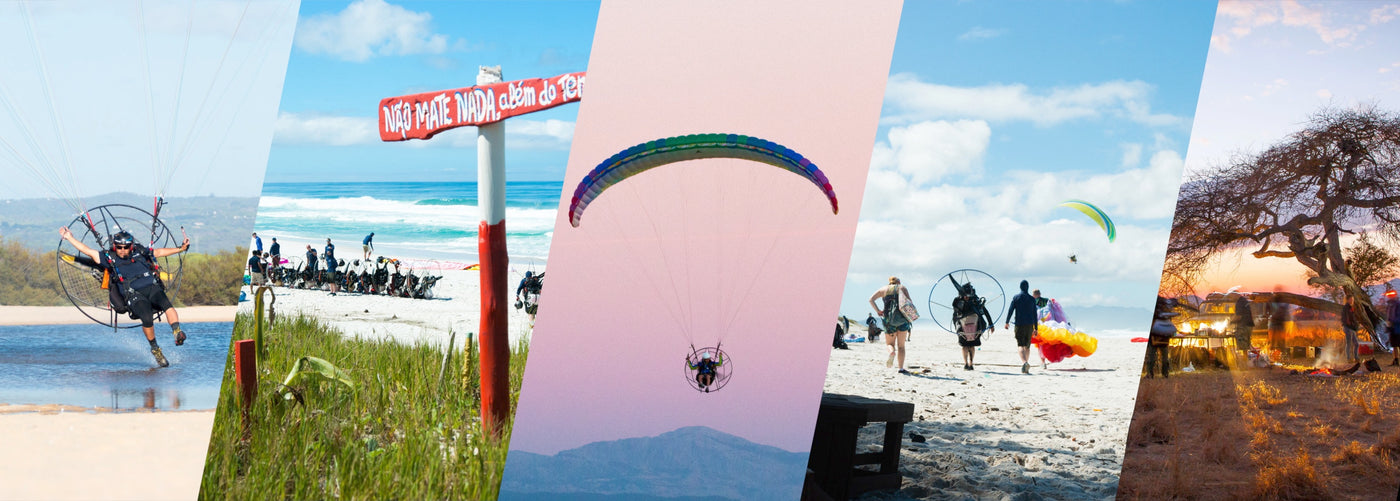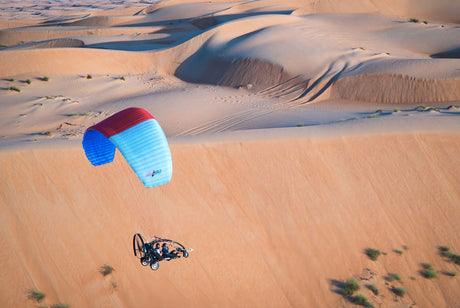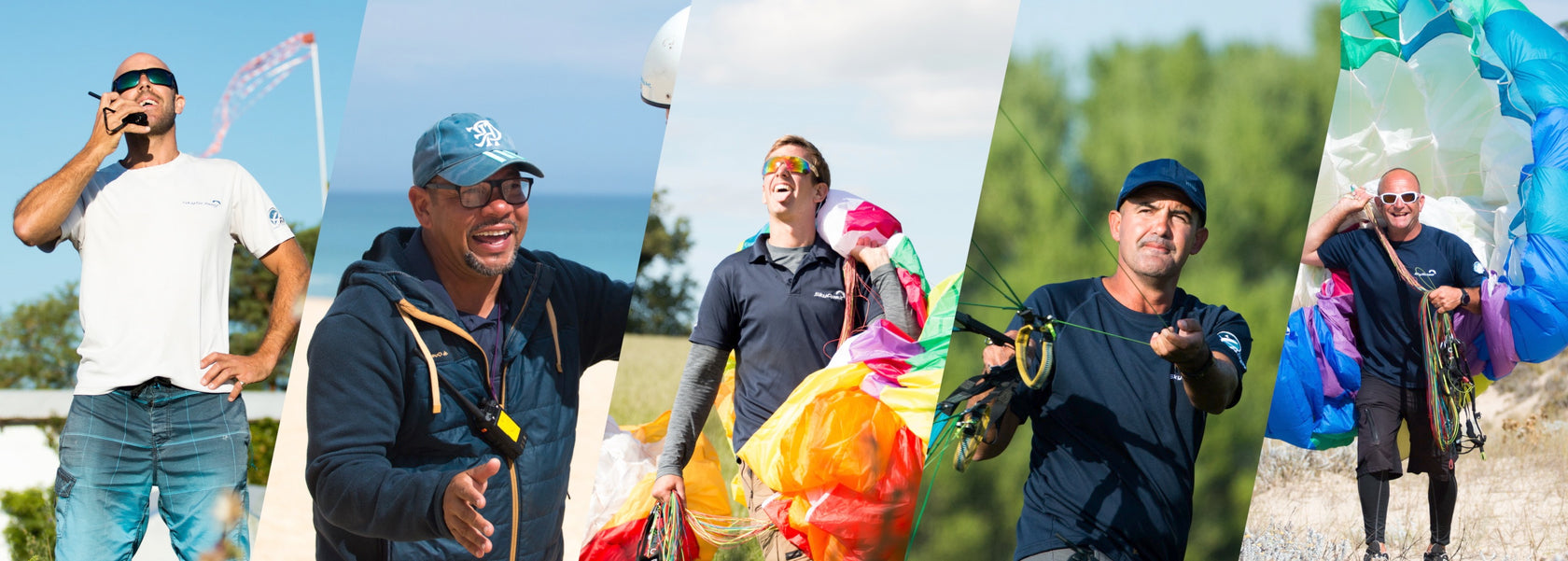On this months' post we catch up again with Bruce Daniels, who seems to be going from strength to strength on his flying journey. Bruce recently entered the 2024 British Open Paramotor Championships, sponsored by Liberty Paramotors and Vittorazi Motors, held at Manston Airport in Kent. It is with great pride that we announce he took 1st place in the National Competition, and 4th place in the Open Category.

"Bruce, firstly, a massive congratulations from all of us at SkySchool. How does this recent win feel?"
"I am really happy with my win this year. Clearly the preparation paid off and everything during the competition went mostly to plan. However, next year I would like to climb higher in the Open category scoring."
"Yes, I can imagine with your determination you will want to win both National and Open next year... This is your second time competing at the British Open, coming in second place last year. How did this year compared to last?"
"Last year I came second in both the National and Open categories, however the wind was strong for the duration of the competition which played to my advantage. This year the weather was much better, which meant we had two windows for navigation, an economy task and three precision tasks, making it a much fairer competition with a lot more flying time."
"So tell us about your set up. What equipment did you use, and were there many changes from last year's set up?"

"This year I used the Liberty Paramotors’ Racing Chassis with a Polini Thor 250 engine and an Ozone Viper Six 16m. The chassis was comfortable and had very little torque despite the large engine for my size, making the navigation and precision tasks very easy. The Viper Six was very fast and very efficient allowing me to cover a lot of ground and gain points in navigation windows, whilst also performing extremely well in the FAI economy triangle. I learnt from last year’s competition that a small size glider can be very beneficial given the UK weather, which is why I chose the 16m."
"I understand Carlos from Liberty Paramotors was also there, competing in the PL1 (solo trike) class. Do you spend much time sorting your equipment together and discussing tactics?"
"Generally we try to avoid any last minute changes to equipment as we have spent a long time learning the data for the exact setup. This year the best route to take and tasks to fly seemed obvious to me and without the team flying component in this competition it wasn’t particularly necessary for particular tactics."
"Can you give us a quick run down of the different tasks each pilot has to complete in the competition?"
"There are 3 categories in the new ‘Endurance’ competition format: Navigation, Precision, and Economy.
During the Navigation we are given a 3 hour time window to fly any route and tasks of our choosing to gain as many points as possible. For example, the task may involve following a curve drawn on a paper map and declaring (before takeoff) how many seconds it will take you to reach each turn point. For these tasks we only have access to a paper map and a stopwatch.
During the economy task this year, the goal was to create the biggest equilateral triangle possible with only 3kg of fuel. If the triangle is too ‘flat’ you will incur penalty points.
Precision tasks generally involve engine off spot landings on a target, and bowling landings, where you have to knock down as many skittles as possible when landing."
"And which tasks are your favourite?"
"Precision tasks have always been my favourite, and the bonus is that you can practice them on every single flight. Every landing should be a spot landing."
"Are there any tasks you just really don't enjoy?"
"For me, Navigation has always been my least favourite. I prefer to fly around where I want to go, enjoying the freedom of the sport rather than following a route which will give me the most points. However, I do enjoy the planning and calculations side of it."

"And you've just taken part in the First FAI World Paramotor Endurance Championships. We will catch up with you in next months' episode to see how you and the GB team got on! Again, well done from all of us at SkySchool!"
Safety in Paramotoring
It has become quite clear that competition pilots test their skills and their equipment in challenging conditions. The first thing I noticed when I saw the photograph of Bruce on the podium was that fellow contender Daniel Jones, who took third place in this year's Nationals, was holding his reserve. This prompted me to reach out to Dan, to check that he was alright, and to see what had happened.

Dan had been flying for two hours, having completed two tasks. He elected to collect a few more turn points on the way back to the airfield, which meant flying at full speed to maximise his points in the time remaining. At approximately 10:30 Dan suffered a major collapse at 1,600 feet. He puts the collapse down to mixing air masses combining with thermic activity, which resulted in a washing machine of turbulent air. Due to the configuration of his wing, Dan had stowed his breaks, meaning that once the collapse had occurred, there was little he could do to regain control, ultimately having to go along for the ride. Dan successfully deployed his reserve and landed in a farmer's field. Incredibly, he walked away with no more than a sore neck.
Dan has taken the time to put together a very thought out video analysing this situation in detail. You can watch it here "Analysis Video".
As fellow Paramotor pilots we owe it to each other to learn from these situations. Dan stresses a few points at the end of his video, all of which I totally agree with.
1). You can't throw a reserve if you don't have one!
2). If you fly frequently, an SIV is invaluable!
3). Height is safety.
Dan had enough height (which equals time) to establish that his only option was to throw his reserve. This is why it is incredibly important to ensure you have sufficient altitude when flying at full speed (trims out / speed bar engaged). Had he been any lower at the time of his collapse, he may not have walked away from this one! We are very relieved you are alright Dan, and thank you for sharing this experience with the community!
To wrap up this months' post we would like to congratulate Jonathan Hobbs for taking second place in the British Nationals, and Dan Jones. Well done to all of the other pilots who entered the BOPC 2024!













